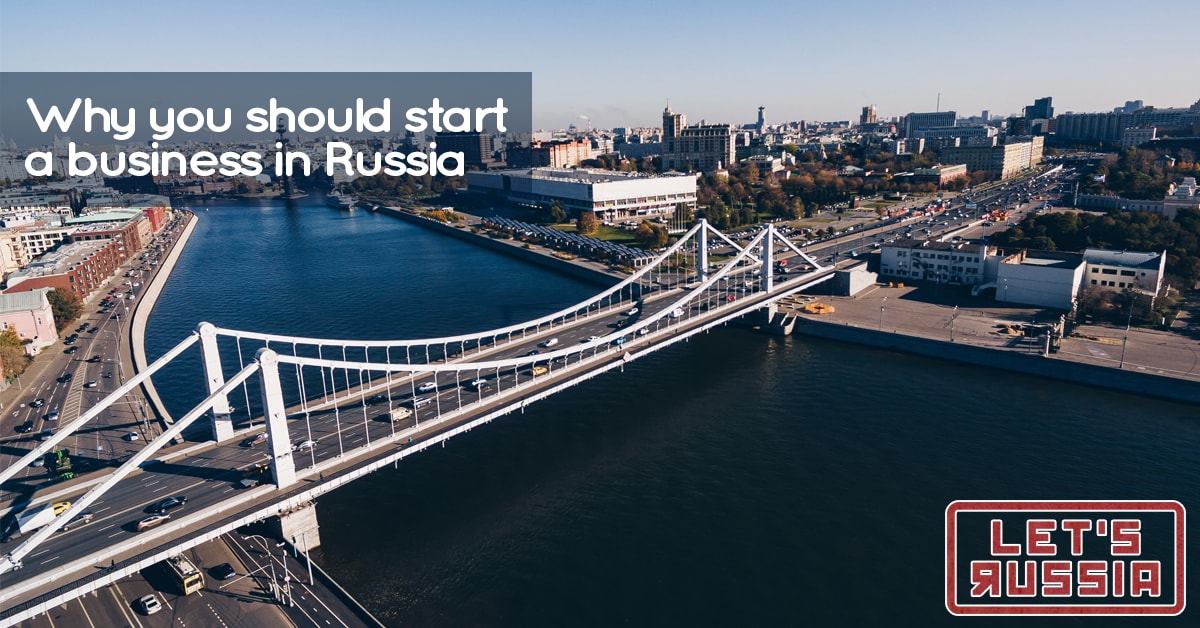Why you should open a business in Russia (not only for self-employed)
Do you know the saying, “One man’s loss is another man’s gain?” I feel it is awfully applicable to the current situation in Russia with a severely devalued Russian ruble, continued sanctions and falling oil prices. While many may be losing in the wake of the COVID-19 pandemic, it certainly doesn’t mean you cannot gain anything during these seemingly unpredictable times. Many businesses are re-evaluating their business strategies and frantically looking to cut costs where they can and Let’s Russia is no exception. We feel your pain.
For a select few, and if you’re reading this, that may include you, opening a business in Russia could potentially be the moment to reach out and seize. Whether you’d like to cut costs, acquire assets at low prices, lower your tax rate or just diversify your business, running a business in Russia could be a great choice for those same reasons and more. In this article, I will cover who would benefit most from opening a business in Russia and reasons why you should consider business opportunities in Russia that you may not have thought about. You don’t even have to be business savvy in order to open a business in Russia. Your current employer could very well be interested in having you continue your work for them from Russia.
Let me start by saying that I would not recommend going to stay in Russia long-term unless you are genuinely interested in Russia, its language, culture, customs or have a support system of family or friends there. Although Russia is a unique country full of wonderful people and traditions, it may be hard to come to grips with the mentality of its people in general and getting used to limitations in communicating with those around you. It turns out that communication in daily life is something we all take for granted until we find ourselves in a foreign country whose language we don’t yet know.
Assuming you have an interest in living in Russia, at least for some amount of time, in most cases, you would be much better off running your own business in Russia than becoming an employee at a Russian company. Unless you’re a highly skilled professional, well-paying jobs at Russian companies are few and far between, particularly at the moment with a weak Russian ruble. Plus, many jobs in Russia tend to be just that and lack real growth potential unless you break off and do your own thing.
To be clear, opening a business in Russia does not mean that you have to start a completely new business venture from zero. You don’t even have to have your own business. You can start a business in Russia if you work for an employer that is willing to let you work remotely. Especially after the COVID-19 pandemic, more and more companies are realizing that many jobs can be done from home. So could you realistically start a business in Russia? Yes, especially if…
- You are self-employed.
- You work for a company willing to let you work remotely.
- You have a day job but have a successful side project.
- You have capital to start a new business.
Let’s dive in further for those who fit any of the above categories. If you are self-employed, you’d need a business that would allow you to partially be location independent. For example, a restaurant wouldn’t apply here unless you have the capital to open a similar restaurant in Moscow. I’m talking about a business that you can run online like consulting, freelancing, programming, dropshipping, shopify, amazon, etc. If you are dependent on location, you need to think about moving some aspect of your business online. For Let’s Russia, that is our membership consulting services. Once you figure out what it is you can do remotely, you can incorporate an LLC in Russia and your customers or foreign companies pays the Russian company for those services.
Let’s say you’re not self-employed but you have a job and an employer you’re quite satisfied with. If your work can mostly be done remotely like a programmer, consultant, advisor, marketer, designer, sales rep, etc, talk to your employer about allowing you to work remotely. You can incorporate your own LLC in Russia and your current employer pays your new Russian company for your services instead of hiring you as a full-time employee. In most cases, you lower your tax rate significantly to just 13% in Russia and your employer saves on social contributions because you are now an employee of your new company, not your previous employer. If your current employer truly values you as its employee, you should have a serious talk about the possibilities of opening your own company in Russia and having your current employer become a client.
The next scenario is that you have income from another source that you do on the side as you have a regular day job. Many do this for years until they can earn enough from their side project so that it replaces their day job. In this situation, you have only a limited amount of time to work on your side project due to your commitment to your employer. What if you could move your side project to Russia and cut costs so significantly that you would be able to quit your day job? You would have way more time to focus on your side project and jump start it to growing faster. With the ruble being so low, you could live a nice standard of life on much less while you’re growing your side project faster. Russia’s income tax is lower, Russia’s simplified tax rates for small businesses are flexible, costs of living in Russia are lower and you get much more for your US dollar than ever before. Utilities, cell phone and internet bills are much much lower compared to the US and Europe.
The last category we’ll discuss here is more complicated but certainly doable, especially if you have the funding. You can take advantage of the weak ruble and convert your US dollars or euros to rubles to bring you a long way in Russia. You could invest in a small local business, online business, real estate or your area of expertise. Setting up a business as a foreigner is still quite straightforward and simple. You could outsource almost all the reporting and accounting at an inexpensive rate so you can focus on business. You can hire an assistant who knows English at a high level to help navigate you through the questions you’ll have along the way. Not speaking Russian isn’t a deal breaker, especially if you do your due diligence on your market.
Although you can start a business in Russia at practically any level of income, the most advantageous option would be to open a company and use the HQS (highly-qualified specialist) visa to employ yourself which stipulates you pay yourself at least 167,000 rubles per month, which, according a fluctuating ruble-to-dollar rate, ranges from $2141 to $2737.
Here are the reasons you should open a business in Russia, assuming the above described fits your situation.
- Open a company in Russia in a matter of a week
- Open a company remotely without stepping foot in Russia
- No limitations to a foreigner becoming a shareholder and owning 100% of a Russian company
- There are simplified tax systems
- Start up costs are low
- Income tax is 13%
- Operating costs are low
- Hire yourself on an HQS work visa
- Processing time for HQS work visa is significantly shorter
- Save your company lots in employee contributions
- Low cost of living
- Access to a high standard of living
- Travel in and near Russia is accessible and affordable
- Open your mind and expand worldview by living in Russia
- Gain a unique perspective coming from a different country
- Learn a new language
- Fast track to residency & citizenship
Most of these reasons could merit dedicating a whole article to each topic individually. Depending on your area of expertise, there are some benefits not listed here. If you find yourself seriously considering business opportunities in Russia and want to know more about your specific area or possibly a new market, don’t hesitate to reach out to us. We’d be glad to walk you through your options and assist you in taking full advantage of opening a business in Russia. We can help you open a company remotely and process your HQS visa and work permit. Don’t put off opportunity when it’s right in front of you.

